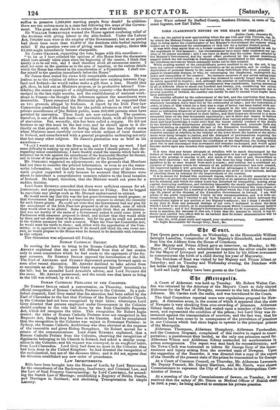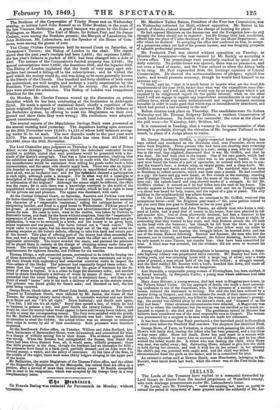gte ifilleftOPOUS.
A Court of Aldermen was held on Tuesday. Mr. Robert Walter Car- den was returned by the Attorney of the Mayor's Court as duly elected Alderman for the Ward of Dowgate, successor to the late Alderman John Johnson. Mr. Carden took the oaths, and was introduced to the Court.
The Gaol Committee reported some new regulations proposed for New- gate. A discussion arose, in the course of which it appeared that the state of Newgate is very shocking from over-crowding of prisoners. Alderman Sidney stated, that the Sheriffs had waited upon a member of the Govern- ment, and represented the condition of the prison; but Lord Grey was de- termined against the transportation of convicts; and the fact was, that his resolution had been come to in consequence of the prevalence of practices in our Colonies which had since begun to operate in the principal prisons of the Metropolis.
Alderman Thompson, Alderman Humphery, Alderman Farebrother, and the Common Sergeept, complained of this resolve in regard to trans- portation; a punishment they lauded, as the only one prisoners oared fir. Alderman Wilson and Aldel•inan Sidney contended for ameliorations in prison arrangements. The report was sent back for reconsideration; and the Town-Clerk was instructed to inform Sir George Grey of the incon- venience and injury arising from the crowded state of Newgate. Upon the suggestion of the Recorder, it was directed that a copy of the report of the Sheriffs of the present state of the prison be transmitted to Sir George.
At a Court of Common Council, on Thursday, Mr. Alderman Lawrence, Mr. Deputy Peacock, Mr. Deputy Harrison, and Mr. Norris, were chosen Commissioners to represent the City of London in the Metropolitan Com- mission of Sewers.
At a meeting of the City Commissioners of Sewers, on Tuesday, it wee resolved that the salary of Mr. Simon as Medical Officer of Health shall be 5001. a year; he being allowed to continue his private practice. I :II
The Brethren of the Corporation of Trinity House met on Wednesday evening, to initiate Lord John Russell as an Elder Brother, in the room of the late Viscount Melbourne. A grand banquet was given by the Duke of Wellington, as Master. The Earl of Minto, Sir Robert Peel, and Sir James Graham, were among the Brethren present; the Marquis of Lansdowne, Sir John Hobhouse, Mr. Labonchere, and the Speaker of the House of Com- mons, were among the guests of note.
The Clergy Orphan Corporation held its annual Court on Saturday, at Freemason's Tavern; the Bishop of London in the chair. The report stated that the past year's receipts had been 5,4331.; the expenses 5,6821.: the last year's balance in pocket of 2371. had been changed into a debt of 248/. The income of the Corporation's funded property was 2,9521.; the annual subscriptions were 1,0041., the donations 4931, and the legacies 250/. The Bishop of London explained that the death of very many aged sub- scribers had caused a falling-off in the subscriptions; and he wished the good which the society could do, and was doing, to be more generally known to the friends of the Church. One hundred and forty children of both sexes are maintained, are well taught, and undergo a yearly examination by the President, Vice-President, and friends of the society. Six girls and five boys were elected for admission. The Bishop of London was reappointed President for the year.
On Monday, Mr. Charles Pearson wound up the discussion on prison discipline which he has been conducting at the Institution in Aldersgate Street. He made a speech of statistical detail, chiefly a repetition of the points originally developed by him; and he answered Mr. Field's defence of the Berkshire system, by offering to meet the Magistrates on their own ground and show them they were wrong. 1 His resolutions were adopted, almost unanimously.
The annual reports of the Marylebone Savings Bank were presented at the annual meeting held yesterday. The depositors having open accounts on the 20th November were 19,019; 14,555 of whom held balances averag- ing under 3/. 3s. Id. each. The new deposits made in the past year were 2,070. The amount invested in the Funds has risen from 291,3861. to 295,886/. since the 20th November.
The Lord Chancellor gave judgment on Thursday in the appeal case of Prince Albert versus Strange. The catalogue, which the defendant contended he was entitled to publish, stated that each purchaser would be presented with a fac- simile of the Queen's autograph. That was a false representation, implying that the exhibition and the publication were both to be made with the Royal consent: any manufacturer would be restrained from selling his goods under such a false representation, and the same rule should apply here. There was also an injunc- tion founded on property. The right of property in unpublished works, if it ex- isted at all, was an exclusive one; and yet the defendant claimed a participation in such right, although quite a stranger. For in what way did a catalogue or description of the etchings differ from a copy? Did not each convey knowledge or information of the original? Although the means might be different, the effect was the same; for in each there with a knowledge conveyed to the world of the unpublished works or correspondence of the author, which he had a right to keep for his private use and pleasure. The appeal was dismissed, with costs.
At the Central Criminal Court, on Saturday, Burrows and Perkins were tried for horse-chanting. The case is instructive to country buyers. Barrows assumed the character of a" respectable tradesman," selling the carriage-horses of an emigrating brother, and lived in a good house in Westminster: Perkins passed as his groom. A country gentleman of fortune saw advertisements of two carriage- horses for sale. He came to town, went to the stables, was taken by Perkins to Barrows's house, and dealt for the horse without suspicion, from the "respectable" appearance of all he saw. Thirty-five pounds was paid; should the horse not give satisfaction, it was to be returned in a week, and the money to be given back, minus expenses and one pound. The horse turned out a "rank roarer." The buyer came to town again, but his deceivers kept out of the way, and wrote ex- pressing surprise at the horse's defects, offering to take him back and return part of the money. This plan of offering part of the money had often succeeded be- fore, and was a legal trap which would have made the affair one of contract, not cognizable criminally. The buyer avoided the snare, and pursued the prisoners
• toll he placed them in custody on the charge of obtaining money under false pre- tences. The verdict having been given against both, Burrows was sentenced to imprisonment for eighteen months, and Perkins for six months.
Thomas Midge, a well-connected person, surrendered to be tried for forging two of those documents called "tasting orders," whereby wine-merchants use to gra- tify their friends with exploratory and somewhat convivial visits to inspect the Wine-cellars of the Docks. The prisoner had repeatedly forged these orders. It seems that the "tasting orders" are issued in the guise of warrants for the de- livery of wines to buyers: it is a crime to forge the statutory order, and another crime to obtain fraudulently a delivery of wines by means of them. It was now contended that the usual tasting order is not in statutory form ; and that a de- livery of small " tastes " only is not such a delivery of wines as the statute means. The prisoner was found guilty for form's sake; and liberated on bail, the law point being reserved.
George Bryer, check-taker, and Henry John Smith, money-taker, at the Queen's Theatre in Tottenham Street, were indicted by Mr. James, the lessee of that Theatre, for stealing twenty metal checks. A constable watched and saw Smith goto Bryer and say "It's all right." Bryer hesitated ; and Smith said again, "Yon fool, I tell you it's all right." Bryer then opened a box, of which he had no business to possess a key, and gave Smith the twenty tickets. The result Would be, that the money-taker would appear to have sold twenty fewer tickets, and be able to keep the corresponding money. The Jury were satisfied with the proofs, bat Mr. Bullock informed them that the indictment was bad: there was plainly no intention to steal the tickets; the actual crime was an attempt to embezzle their value in money by aid of that machinery. Both prisoners were therefore acquitted.
At the Southwark Police-office, on Tuesday, William and John Scollard, bra- thers, buttermen of Bermondsey Street, were reexamined, and committed for trial, on a charge of wilfully setting fire to their house. The evidence against them was strong. When the firemen had extinguished the flames, they found that there had been three distinct fires, all, it would seem, wilfully prepared; there was little property in the shop, though the brothers had an insurance for 3201.; the prisoners were found in a back-yard, partially dressed; and on John were dis- covered money, a watch, and the policy of insurance. At the time of the fires, in the middle of the night, there were some thirty lodgers sleeping in the upper part of the house.
Mr.Ballantine, the senior Magistrate of the Thames Police-office and the oldest of the Stipendiary Magistrates of the Metropolis, has retired from his office on a on, after a service of more than twenty-seven years. 111 health compelled
to send in his resignation; which was accepted by Sir George Grey in a very remplimentary letter.



























 Previous page
Previous page